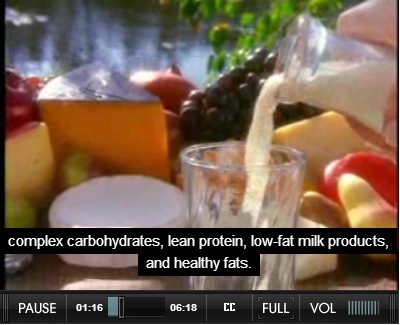
|
Calories Guideline for Emeritus
Examples:
- An Emeritus woman over 50 who is:
- Not physically active needs about 1,600 calories a day
- Somewhat physically active needs about 1,800 calories a day
- Very active needs about 2,000 calories a day
- An Emeritus man over 50 who is:
- Not physically active needs about 2,000 calories a day
- Somewhat physically active needs about 2,200 - 2,400 calories a day
- Very active needs about 2,400 - 2,800 calories a day
For more tips on staying healthy, we invite you to visit our
Healthy Living section.
Healthy Eating
It is important for Emeritus to eat balance meals more than ever to maintain their
health. See guidelines below for what food to consider and how much.
Emeritus Food Pyramid Guidelines
- Fruit - Focus on whole fruits, rather than juices, for more fiber and vitamins,
and aim for around one and a half to two servings each day. Break the apple and
banana rut and go for color-rich pickings like berries or melons.
- Veggies - Color is your credo in this category. Choose antioxidant-rich dark,
leafy greens, such as kale, spinach, and broccoli, as well as orange and yellow
vegetables like carrots, squash, and yams. Try for two to two and a half cups of
veggies every day.
- Calcium - Maintaining bone health as you age depends on adequate calcium
intake to prevent osteoporosis and bone fractures. Emeritus need 1,200 mg of calcium
a day through servings of milk, yogurt, or cheese. Non-dairy sources include tofu,
broccoli, almonds, and kale.
- Grains - Be smart with your carbs and choose whole grains over processed
white flour for more nutrients and more fiber. If you are not sure, look for pasta,
breads, and cereals that list "whole" in the ingredient list. Emeritus need six
to seven ounces of grains each day (one ounce is about one slice of bread).
- Protein - Emeritus need about 0.5 grams of protein per pound of bodyweight.
Simply divide your bodyweight in half to know how many grams you need. For example,
a 130-pound woman will need around 65 grams of protein a day. A serving of tuna,
for example, has about 40 grams of protein. Vary your sources with more fish, beans,
peas, nuts, eggs, milk, cheese, and seeds.
For more information visit: m.helpguide.org/articles/healthy-eating/senior-nutrition
For more tips on staying healthy, we invite you to visit our Healthy Living section.
Eating Out
Eating out is enjoyable, but restaurants often serve large meals, which can be high
in calories, fat, and salt.
Tips to Make Your Meal Both Delicious and Nutritious
- Order foods such as salads with lean meats, low-fat or fat-free cheeses, and other
toppings. Choose low-fat or fat-free salad dressing, and ask for the dressing on
the side to control how much you use.
- Choose foods that are baked, broiled, braised, grilled, steamed, sautéed, or boiled
instead of fried. With these cooking methods, little or no fat is added to the food.
- Hold the "special sauces." Ask the kitchen not to top your dish with butter or whipped
cream.
- Choose foods with a tomato-based or red sauce instead of a cream-based or white
sauce. Cream-based and white sauces usually are made with butter, milk, and cream,
and are high in calories and saturated fat. Tomato-based sauces usually contain
more vitamins, less fat, and fewer calories.
- Ask for food to be prepared without added salt, and do not add salt at the table.
- Drink water, fat-free or low-fat milk, or other drinks without added sugars.
- Instead of french fries, try a small baked potato, side salad with low-fat or fat-free
dressing, or fruit.
- Order an item from the menu instead of heading for the "all-you-can-eat" buffet.
Additional Tips
- Do not skip meals. It is important to eat regularly in order to maintain normal
metabolism
- Emeritus will have a harder time absorbing adequate amounts of the B12 vitamin.
For this reason, it is important to eat cereals fortified with this nutrient or
taking vitamin B12 supplements with meals.
- Hold the "special sauces." Ask the kitchen not to top your dish with butter or whipped
cream.
- Drink plenty of water. Although Emeritus often feel less thirsty then they used
to, it is important to stay hydrated by drinking plenty of liquids such as water
and other drinks without added sugar. Fat-free or low-fat milk, 100% juice, coffee,
and tea also are good sources of fluids, as are foods with high moisture content
such as fruits, vegetables, and low-sodium broth-based soups
For more tips on staying healthy, we invite you to visit our Healthy Living section.
|


